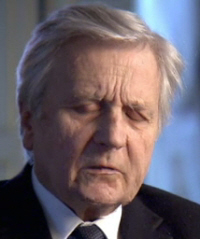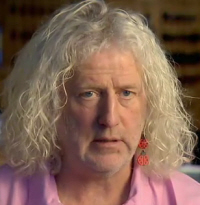From Boom to Bust
The ever-perpetuating Cycle.
From boom to bust – the first sign it was all going horribly wrong appeared in the US and spread to Britain. The collapse of huge
banks such as Lehman Bros and Royal Bank Of Scotland rocked the global economy.
European leaders saw it as an Anglo-American mess, caused by the recklessness of Wall Street and the city of London. Germany's
Chancellor Merkel made a pointed contrast with the thriftiness of the Swabian hausfrau.
Angela Merkel "As we are in Stuttgart, we should ask a Swabian housewife. In the long run, you cannot live beyond your means."
Lehman Brothers
And while Britain and America were mending their banks, the eurozone did too little to strengthen its banks.
In the summer of 2009, Europe experienced its own earthquake. As the global slowdown began to bite, a new Greek government revealed
massive hidden debts.
Louise Cooper "Greece essentially lied about its debt position. The political class in Greece manipulated the number four years.
They manipulated the number to get into the eurozone and once they were in the eurozone, they manipulated them for a good few years
afterwards"
Louise Cooper
Greece disclosed that government debts were €300 million, 129% of its GDP, and the debts were to become bigger and
bigger, because the global recession led to a slump in the payment of taxes.
Louise Cooper "Growth hides debts. Once the economic growth disappears then you suddenly realise a lot of the growth
was fuelled by debt and in fact, the country's debt position deteriorates rapidly."
The Greek government slashed public spending and raised taxes, causing riots. Lenders to Greece began to fear they
wouldn't get their money back and stopped lending. So, Greece had no choice but to ask for a bailout from the EU and
the IMF, even though the Maastricht rules had prohibited bailouts.
Lord Lamont
Lord Lamont "The rules can always be bent. The most blatant example that was the first bailout Greece, which was
done under an article of the treaties, which was actually meant to deal with natural disasters like floods and earthquakes. "
With the bailout of €110 billion for Greece, the centre of the financial and economic storm shifted from Wall Street and
London to the eurozone, as the chairman of the US Federal reserve ruefully pointed out to his European counterpart.

Jean-Claude Trichet
Jean-Claude Trichet "Ben Bernanke was only telling me approximately at that time, Jean-Claude, now it's your turn. It was
clearly the illustration of the fact that we were in the epicentre of a crisis. "
Other hugely indebted eurozone countries also find themselves boycotted by investors. Ireland and Portugal were next to
be bailed out, at the price of having to implement brutal cuts to balance their books.
In Italy, the condition for restoring calm to markets was the ejection from office of the Prime Minister, Silvio Berlusconi.
The Irish economy, especially its property market, was ruined.

Mick Wallace
Mick Wallace "I remember coming back.I came home and I sat down with the accountant and he said, 'We're in trouble.'
The banks changed their mood dramatically. People used to come to us to have talks said, 'Now you come to us.' People who
were our friends treated us like we were rubbish. Before the crash, I would have been conservatively valued at about 70 million.
Now, the banks are moving in on the assets, they are selling them for peanuts. They would probably realise out 10 million for them.
What was worth 70 million is now valued at 10 million."
Mick still owes the banks €40 million, which he hasn't got. Hundreds of Irish property developers were in the same parlous
state, and they were bust so too where the banks that lent to them. So, the Irish government nationalised almost the entire
Irish banking system and promised to honour their debts at crippling cost to Irish taxpayers.
Mick Wallace "European banks, ACB, EU, in Germany in particular, did not want our banks to collapse, because it meant
that their banks wouldn't have got their money back. And the notion that the taxpayers should actually be taking care of
the problems of badly run, failed, useless banks has been a bitter pill."
By December 2011, European leaders gathered, with the euro perilously close to collapse. There are growing fears that
the Italian and Spanish governments wouldn't be able to repay their massive debts. Europe's leaders tried to restore calm
by reviving and toughening the constraints on borrowing by governments that had been abandoned just six years before. In
Britain, the headlines were all about how David Cameron made it harder for eurozone leaders to reform the currency union.

David Cameron
David Cameron "it's important that we get the things that Britain needs so I decided not to sign that treaty."
But while eyes were on bickering European leaders, something much more important and more dangerous was taking
place in the ether of financial markets.
In the autumn of 2011, the eurozone banks were finding it increasingly hard to borrow. They were being boycotted by
giant US money market funds who are refusing to lend them even a dollar. Big European banks, like these here in Frankfurt,
where increasingly wary of lending to each other.
Now, when banks can't borrow, they can't land and, in the worst-case, they find it hard to repay their debts and
they go bust. The eurozone was facing a full-scale, potentially devastating, banking crisis.


